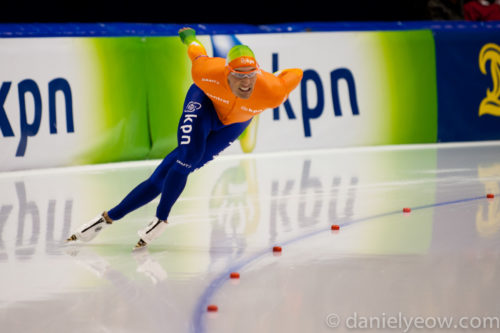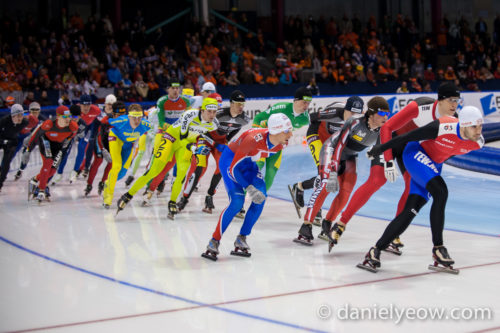Pyeongchang Day 14: Mens 1000m
Recap
What a race, and finally a predictable result. Apologies to confused readers out there because I seem to be losing my mind – yes, I forgot to include Håvard Lorentzen in my predictions and he was very obviously a contender for the gold. In another incident of what is technically known as a “brain fart” I went on and on about how some lowland track records were faster than Pekka Koskela’s old world record. That is obviously not the case – significantly, lowland records have started to push the 1:08 mark, but that’s still a whole second slower than 1:07. In any case, as predicted Kjeld came first (1:07.95) after initially posting a slower first lap than Lorentzen. Both already had a gold medal in their back pocket and were trying to make it a double – Kjeld going for the 1000-1500 and Håvard going for the 500-1000. In the end, it was all in the start, and ironically enough it was the 1500m olympic champion with the faster start bettering the Norwegian by 15 hundredths, then putting in a first lap which was 12 hundredths slower, and doing a nearly-identical last lap – Kjeld’s was 26.60 while Håvard’s was 26.61. In third place, Korean Kim Tae Yun with 1:08.22, faster than Kjeld’s track record from last year, but ‘only’ good enough for 3rd. Joey Mantia perhaps a little unlucky to come 4th (although certainly a little lucky to be 4 thousandths of a second in front of Takuro Oda in 5th). So after not picking up a single medal in either of the mens or ladies 500m, the Dutch bounce back with a good win in the 1000m and Kjeld Nuis becomes the first double olympic champion in speed skating at these games where we expected at least one double earlier on (Nao Kodaira in the 500m and 1000m, and Sven in the 5000m and 10000m). Notable also is that 1st and 2nd both started from the inner lane, and both did not ever get to draft behind the other skater in their pair, with both of them so far ahead by the second crossing that they passed in front of the other skater in the pair.
And so concludes all of the individual distances at these Olympic games. As usual click here to listen to my live commentary of the event.
Coming Up
The final event of this games is new to the olympic program so making a prediction is especially difficult. I spilled considerable digital ink explaining the mass start and all of its rules and quirks and history. From a game theoretic point of view you can expect the olympics to play out very differently to the world cup qualifying events. In the qualifying events, the object was to be ranked in the top 24 after three races. Therefore the optimal strategy is to win one or two intermediate sprints and get a ranking above 16th or so in at least one race. When all was said and done, because of the exclusion of Russian athletes, it turns out that you could place around 20th or even slightly higher in two races and still just slip into the top 24. This is because there’s a limit to how many skaters per country can be entered, and even though you may be the 26th ranked skater, once the 3rd ranked skater from a few countries (there only need to be two) are removed, you move into the top 24. Looking at the world cup rankings is interesting because it becomes very clear that only a handful of countries even thought about this and played their cards optimally.
In the olympics, however things are different. First of all, the format is much more… exact. There are exactly 24 entries which are split into two semifinals of 12 skaters each. Out of those semifinals, 8 skaters will qualify for the final, and will contest a 16-skater final. The numbers will be slightly lower because some skaters may have pulled out due to sickness or injury, but that’s what it will come down to. The semifinals will play out similarly to how the world cup events did – everyone will be scrambling for the odd point here or there in an intermediate sprint to ensure a high enough ranking for the final. 3 points will all but mathematically guarantee advancement to the final, in practical terms it is likely that even 1 or 2 points might be enough. Forgoing all the intermediate sprints and waiting for the final sprint in the semifinal seems a very risky strategy because if you come 4th in the final sprint, you get exactly 0 points for the effort and be ranked below someone who picked up a single point in an early sprint and finish almost a full lap behind you (I say almost because if you’re lapped, then you are taken out of the race and receive a DNF and no points). However, in the final you can expect everyone to be going for the finishing sprint. Pretty much the only scenario I can think of where you wouldn’t go for the finishing sprint is where you manage to get two skaters from the same country into the final and so one of them is ‘working’ for the other one to win.
Look out for – Peter Michael (NZL), Alexis Contin (FRA), Bart Swings (BEL) – inline skaters who are multiple world champions and are good enough on the ice to combine their innate ability to sense what is happening in the pack, with the technical skill and physical weaponry required to even be competitive in the event. Defending world champion Joey Mantia from the US also falls into this category and will be one to watch. From the dutch we have Koen Verweij rearing and ready to go after being sat out for the team pursuit (he was the substitute), and surprisingly Sven Kramer has been entered instead of Jorrit Bergsma, and even though Sven lacks the marathon pack racing experience that Jorrit has, he also most definitely has those ‘weapons’ I was talking about earlier (top speed, endurance, acceleration) in abundance. My pick for the win however is Lee Seung Hoon from Korea. Short track background so he’s good in a pack, former 10k olympic champion so he has the legs to carry him to the end, and one of the fastest flying laps in the field – his ‘weaponry’ is in my opinion the most complete and well-suited to this race out of everyone’s. Also look out for Harald Silovs from Latvia, 4th in the 1500m, another good former short tracker (he was European champion a few times) who knows how to race in a pack.
In the ladies, the Italian Francesca Lollobrigida is surely one of the favourites, a multiple world champion on inline skates, Irene Schouten from the Netherlands, a competent inline skater as well as marathon skater also one to watch and for similar reasons. Kim Bo Reum, defending world champion is a chance for the win, especially with the home crowd, and on form the silver medallist from last year’s world championships Nana Takagi, fresh from a gold medal in the team pursuit may be able to go one better. Dark horses to watch – Elena Rigas from Denmark, a strong and importantly clever racer coming from inline picked up a surprise silver medal in one of the qualifying world cups – Denmark’s first ever world cup medal, could sneak away with another medal, and Claudia Pechstein, skating in her 7th Olympic games (I may have mentioned that already) also with an outside chance for the win.
As usual, you can listen to my live commentary of the event here. Live from 8pm local time, noon in Berlin, 11am GMT.



Leave a comment